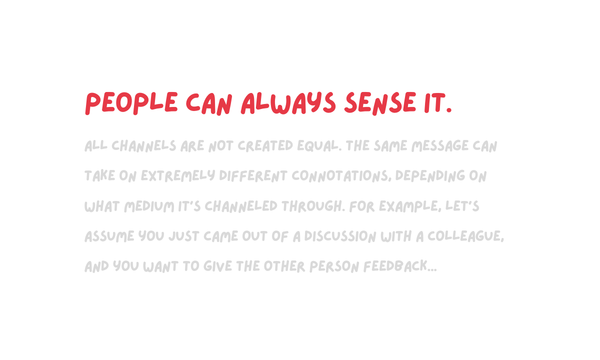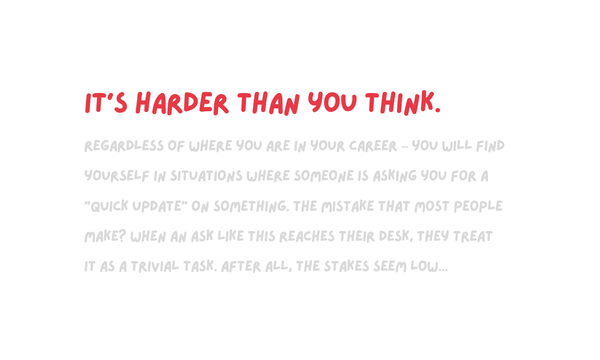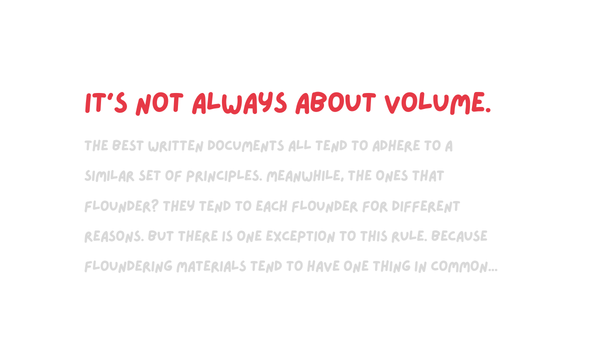What Do You Actually Get From Writing Online?
If you're not writing online, you're missing out on some valuable life lessons.
Here are six life lessons that I've learned so far:
- 🍽️ Find the Silver Platter.
- ⛏️ You're Either Digging or Deploying.
- 📈 Toggle Your Life's Axes.
- 🧊 Decorate the Tip of Your Iceberg.
- 🧪 Focus on Controllables.
- 🚆 Remember to Lay Your Own Tracks.
🍽️ Find the Silver Platter.
A piece of content can see very different outcomes – simply based on how you choose to serve it up for your audience.
On the one hand, you can default to what's easiest for you, e.g. writing large bodies of text with minimal editing, and just pushing it out.
For instance, this is what my original manuscript looked like for one of my posts:
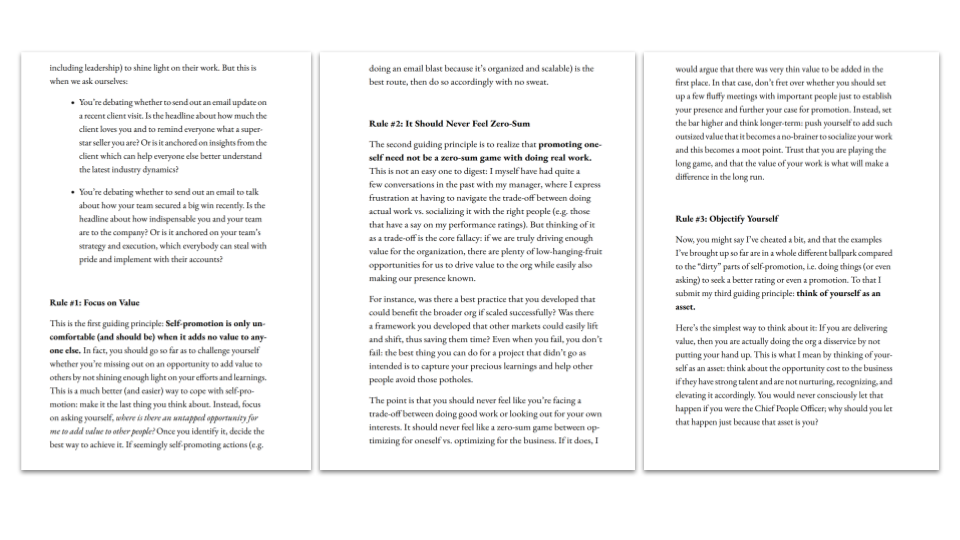
On the other hand, you can intentionally give your content to your audience on a silver platter.
For instance, I decided to distill the same long-form content into actionable, digestible, and swipable nuggets:
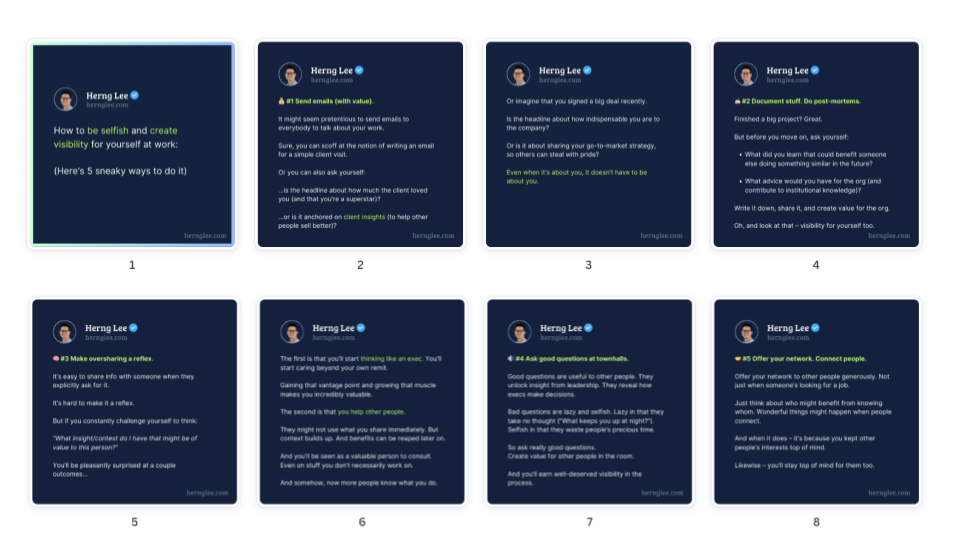
Of course, this requires much more post-production work. But that extra effort often dictates whether something actually lands.
A lot in life is the same. It doesn't matter how much wisdom you have. It doesn't matter how right you are.
Because if you're not thinking about how to make it easy for the other person – your message will struggle to resonate.
And that's a shame, isn't it? So much goodness is there already. All it takes is that extra last mile.
But you have to put your audience on a pedestal – not yourself.
⛏️ You're Either Digging or Deploying.
As a writer, I find that I often have to make trade-offs between either digging or deploying.
Digging is what I call the process of laying the groundwork and building an asset. It includes everything from ideation, writing, editing, to polishing.
Deploying is when I try to squeeze value out of the asset. Often that means packaging and distributing my work to generate the influence that I want.
Digging and deploying are not necessarily zero-sum. But sometimes it can feel that way.
For instance, I started out this journey doing nothing but digging. I wrote, wrote, and wrote; I thoroughly enjoyed building my asset.
And then I realized: without learning how to deploy my assets, there would be no influence. None of the value could get out.
But as I embarked on this journey of putting my work online, sometimes I found myself over-correcting.
There were days where all I could think about was deploying. I fixated on optimizing my distribution channels, my call-to-actions, my engagement tactics, and everything else associated with how I share my content.
It's not wrong – but it was definitely unhealthy. And it came at the expense of digging. I ended spending less time building assets of value.
But assets are the only things that last.
The first 20+ years are all about digging and building, as we turn ourselves into usable assets through schooling. At some point we start deploying, and we reap the rewards accordingly via our paychecks.
Then at some point we realize digging doesn't necessarily come at the expense of deploying: the more you work and upskill, the more valuable you become. And that's a great scenario to be in.
But at some point later on in your career, you'll start facing trade-off's, for example:
- Do I opt for a role that pays less but expands my skillset and improves my long-term competitiveness (i.e. do I play the long game and choose digging over deploying)?
- Or do I take the safe route and stick with what works (i.e. focus on squeezing value out of what I've built)?
The latter is almost never the right answer – but it's not always the wrong answer.
The only right answer here is this: it's OK to index more on one over the other, but it's all about balance over time.
Sometimes it should be more about digging and investing in yourself. Sometimes it's perfectly reasonable to reap the rewards of what you've built.
But you just have to keep asking yourself the question: Am I digging or deploying? And why?
👋 Subscribe for free to get Herng's newsletter directly in your inbox.
📈 Toggle Your Life's Axes.
Here are two real charts that capture my subscriber growth over two separate 60-day periods.
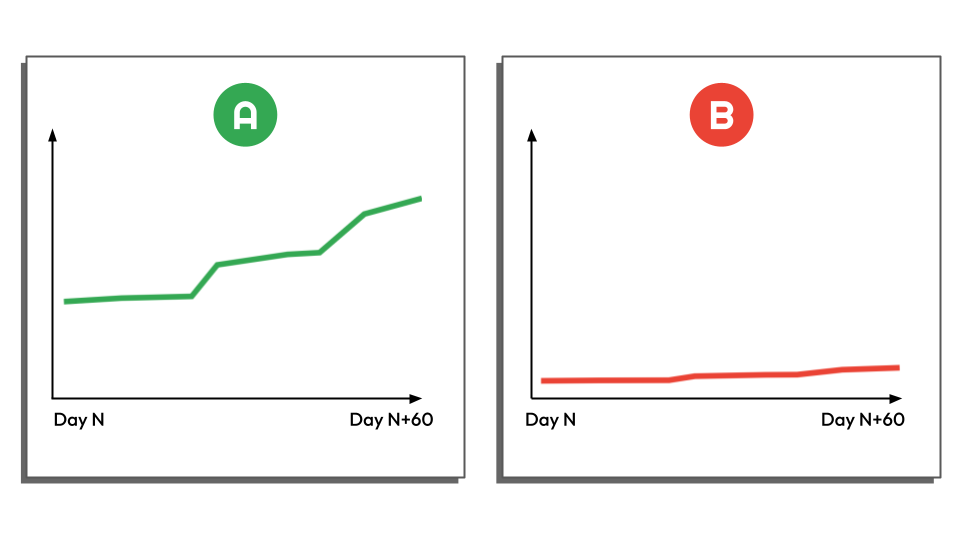
Quiz time: between A and B, which period was when I first started out? And which one was when I was a on a roll?
It turns out that A and B are the exact same period. The only thing that's different? The vertical axes I used.
Such is the case in life as well. Use different axes to contextualize your world depending on where you want to go. Never be too high or too low.
For instance, use the axes in Chart A if you need to find motivation. Set frequent milestones and celebrate small wins (I certainly do). Be proud of what you've accomplished, and find ways to keep the fire going.
But don't lose sight of the big picture either. Think about Chart B so you don't let short-term wins get to your head. Think about Chart B when you get dragged down by tactical or trivial distractions.
Remember your northstar, and don't stray from it.
There's no "right" set of axes for life. But you're always in control of the toggles.
🧊 Decorate the Tip of Your Iceberg.
When you write online, you realize the importance of building a good hook.
This is a hard truth for people to swallow. Most people invest 99% of their efforts into building their content, and write the hook last with minimal effort.
But if you don't have a good hook – people will never have the chance to see your content. They'll swipe past and move along.
Think of your work as a giant iceberg – but only the tip is visible.
(And forget about Titanic for a second – that's not where this analogy is going).
If you don't give people a reason to look beneath the surface – they'll simply sail past. You don't get a chance to make the impact your work deserves (OK, maybe the Titanic imagery still works).
In all seriousness – this is one of my biggest learnings from writing online.
In other words, there's no shame in decorating the tip of your iceberg.
The same is true at work (and in life) as well. There's no shame in promoting yourself. Just make sure it doesn't come at the expense of doing good work.
Think of it as giving people the chance to discover all the goodness beneath the surface.
(For more on this topic: I talk extensively about the right way to increase visibility for yourself here).
🧪 Experiment. But Focus on Controllables.
I write primarily on LinkedIn. And I have discovered a couple things in the process.
Here's the first thing. Much like creating on any other platform, you are always subject to the algorithm. Sometimes it works in your favor, sometimes it doesn't.
Here's the second thing. A lot of uncontrollable factors will dictate your short-term success. Sometimes you'll get a traffic spike simply because an important person commented. And sometimes you won't get so lucky.
Regardless, here's the lesson: you need to believe that your efforts will eventually pay off. But you must also acknowledge that a lot is outside of your control.
And we can only ever control what we can control.
If you can ground yourself properly with this mindset, you'll find yourself a lot more poised. You'll acknowledge when you get lucky and ride on the occasional tailwinds. You'll also cut yourself some slack when you happen to be in a rut.
🚆 Leverage Platforms. But Lay Your Own Tracks Also.
Writing on a platform like LinkedIn means that you are subject to both the good and the bad.
The good is obvious – you get discoverability. You're not starting from scratch.
But the bad is obvious too – you're subject to the algorithm's preferences. And if you want to direct traffic out to your own website or newsletter? Be prepared to take a hit on impressions and reach.
After all, it's only natural that the platform wants to retain its traffic pool.
And hence begins this subtle battle between leveraging the platform (e.g. growing your following on Instagram, LinkedIn, YouTube), while still consciously investing in a brand or medium that you fully own.
This is hard.
Sometimes these objectives are zero-sum: it's clear what the algorithm wants to reward. As a result, it's tempting to just take the easy path and focus on growth within the platform.
That's fine. But now think about the parallels to our careers.
You see, a lot of people mistakenly attribute their success solely to their own efforts. They forget the tailwinds they've received (and continue to receive) from things like:
- Their company's brand name
- Their manager's influence
- The power of their leadership
- The resources of their company
All these things are platforms. They're vehicles that allow you to run faster than others. They're fulcrums and planks that give you disproportionate leverage.
But the question is this: Can you still do as well on your own? What is the value you bring once you no longer have the platform (e.g. your company) to depend on?
Continue to leverage the platform. But invest in yourself and lay your own tracks in parallel.
Be hyper-aware of what you are actually building and retaining for yourself.
